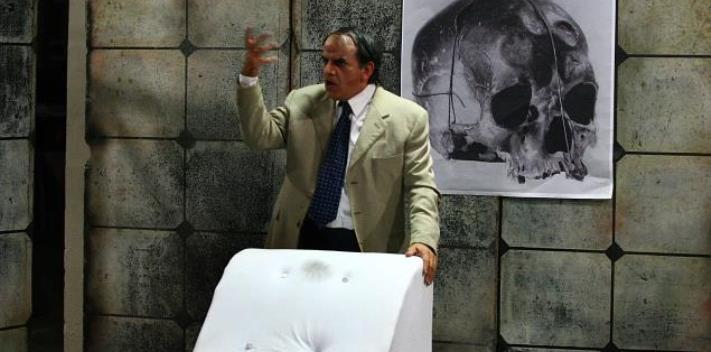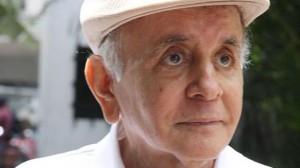
EspañolThere is no doubt that Edmundo Chirinos (1935-2013) was entirely responsible for his own downfall. A public figure since his high-school days, Chirinos ran for president of Venezuela, governed the country’s primary university, became the private therapist of two Venezuelan presidents, and published countless academic papers.
Above all else, however, Chirinos was a man with an inflated ego, who near the end of his life committed a crime so heinous he was shunned by all society. If he thought people would have gathered to see his coffin descend into the ground, he couldn’t have been more wrong. There was no wake or memorial service, only a cremation that no one was around to see.
The man who provided therapy for Presidents Jaime Lusinchi (1983-1988) and Hugo Chávez (1999-2013) died in utter disgrace, after it was discovered that, in 2008, he seduced and murdered a 19-year-old girl. During his trial for the murder of Roxana Vargas, he received no favors from his Chavista buddies as prosecutors demonstrated evidence of how he drugged and raped at least 14 other women.
Unlike most other convicted 70-year-olds in Venezuela who serve out their time under house arrest, the court sentenced Chirinos in 2010 to 20 years at Yare III, one of the country’s most dangerous prisons. In 2012, he had a stroke, and the court finally granted him house arrest. He lived out the remainder of his days in the same house where investigators had once found evidence to suggest Vargas was not his only victim. Authorities found him dead on August 24 of the following year.
Even in a country as accustomed to violence as Venezuela, the Vargas case shocked the nation. Police found her body in a dumpster on the outskirts of Caracas.
Vargas was a journalism student who struggled with anorexia and maintained a blog called “Princesas Anas”: her entries ultimately led investigators to Chirinos’s doorstep, and the blood in his office. Police discovered Chirinos was her therapist, even though Roxana’s family was poor and Chirinos was among the most expensive psychiatrists in Venezuela.
Journalists meticulously recorded Chirinos’s saga, and the trial that turned him into a social pariah. The first book to hit the shelves was Blood on the Couch (Sangre en El Diván) by Venezuelan reporter Ibéyise Pacheco. Besides the evidence presented at Chirinos’s trial, Pacheco included over 40 hours of recorded conversations with the psychiatrist. It is far and away the best selling book in Venezuela over the last decade.
A summary of these conversations between Pacheco and Chirinos was subsequently turned into a play by the same name. The renowned actor and director Héctor Manrique provides a masterful portrayal of Chirinos, juggling the psychiatrist’s phobias and philias.
The terror he provokes in the audience is almost palpable as he warns them: “Careful. You don’t know who I am.” Manrique brilliantly captures Chirinos’s disdain for the girl he killed, for Chávez, for Lusinchi, and everyone around him; his obsession with death, his joy at seeing relatives die, and above all, his profound self-worship.

Chirinos created a world in which he was the only one that mattered, and surrounded himself with people who never dared to criticize him. He became a monster who collected over 3,000 photographs of his patients, sedated and naked, as shown in the Roxana Vargas case file.
Many of the details about his private life that emerged near the end of his life were open secrets in Caracas, but no one ever dared speak of them.
Blood on the Couch also provides the audience with a tour of the last 60 years of Venezuelan politics, from the death rattle of the Marco Pérez Jiménez dictatorship in the 1950s to the early years of the 21st century. “Chávez is a liar, manipulator, but [he’s] not smart,” Chirinos says about the same man he had only recently asked for a presidential pardon. His letter was never answered.
Manrique, head of Actors Group 80, is one of Venezuela’s most recognizable celebrities. He’s among the most talented disciples of José Ignacio Cabrujas, the greatest playwright in Venezuelan history. In recent years, Manrique has revived many of Cabrujas’s plays, such as El Día Que Me Quieras (The Day You Loved Me).
Manrique also knew Chirinos in person. The psychiatrist was a close friend to his parents, and his mother never believed the accusations against Chirinos. The actor benefited from the first-hand experience and it shows: Manrique effortlessly mimics his twitches, voice, and gestures, almost as if Chirinos has come back from the dead.
Thousands of Venezuelans have seen Blood on the Couch, as it continues to tour around the country, and will more than likely be transformed into a feature film. Despite the economic crisis, Chavismo, and the general public’s apathy toward anything not coming out of Hollywood, Venezuela’s theater industry is being kept alive by this stunning play.
The reasons for the success of Blood on the Couch are vast, but it may just be that the play reminds people that all of us, even those larger than life figures who abuse their power, will have to pay for our misdeeds in the end.
 Versión Español
Versión Español












